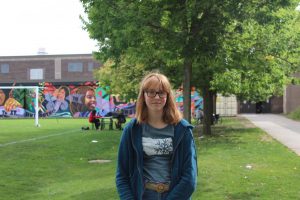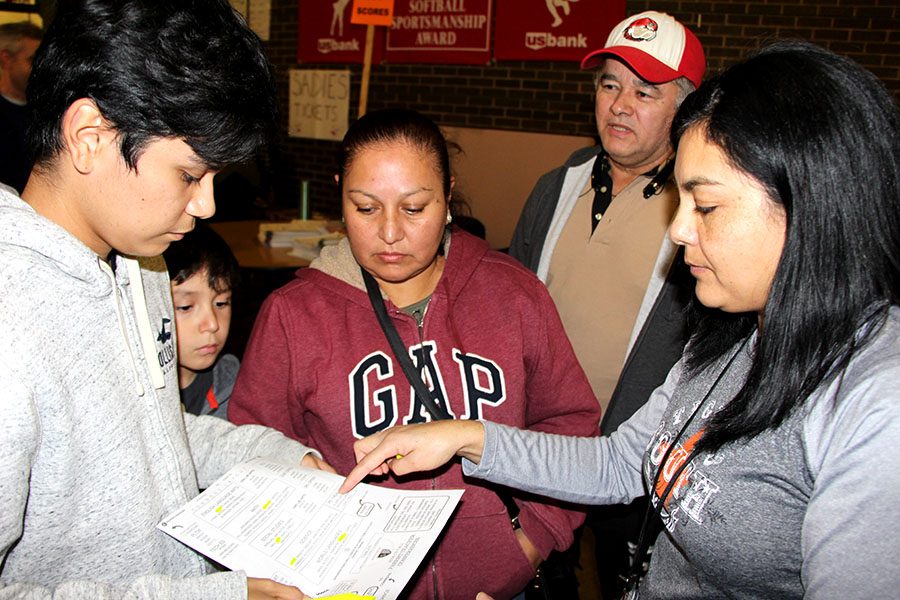Language barrier posed at conferences, Equity team proposes solutions
Esmeralda Duran-Silvan, South’s Spanish and English speaking parent liaison, helps a Spanish-speaking family at parent-teacher conferences. Because of the lack of allocated resources for interpreters and services for non-English speaking families, there usually isn’t enough interpreters for all of the families that need one. “You’re going to have a far longer conversation with an English speaking family than you are with a translator… You know that there’s other people waiting for them,” said Alex Endeshaw, chair of the Equity team at South.
Communication between families and teachers is essential for a student’s success. Information like grading policies, behavior issues, and even just checking in are necessary for families to understand how their student is doing in school. This may seem like a basic requirement, but for families that don’t speak English, it can be a challenge.
Non-English speaking families at South have a variety of resources available to them. There are two multilingual parent liaisons that parents can speak to, Esmeralda Duran-Silvan, who speaks Spanish and English, and Ahmed Ali, who speaks Somali and English. The Minneapolis Public Schools district has a phone line that families or staff can call to have a translated conversation. There are also other programs families can get involved with to learn more about how school works at South, like the CPEO Parent Academy.
“[These programs can] be the only way that families can have, or get access to, benefits that, or to programs that, the school has,” said Duran-Silvan.
While all these things are beneficial, the resources and amount of staff in these programs are often limited. Interpreters are not always available on the district phone line, there is only one parent liaison per language, and the extra time and effort that it takes to interpret everyday communication can slow down the process.
“I think that it…slows down a lot of those conversations, about what teaching is, what education is, what success means. They happen, but…we don’t know if we’re reaching the same levels of understanding,” said Aaron Blum, an English teacher for the English Learner program.
These issues are especially relevant with conferences having just happened. Non-English and English speaking parents alike come to conferences to hear about their child’s progress and check in with teachers, an especially important interaction for families that can’t just send a quick email or make a brief call.
However, families that don’t speak English require an interpreter to talk to teachers, while families that speak English can just have a simple conversation. Because of the lack of allocated resources for interpreters and services for non-English speaking families, there usually isn’t enough interpreters for all of the families that need one. This leads to long lines and less time to talk with teachers.
“You’re going to have a far longer conversation with an English speaking family than you are with a translator, and part of that is because those English speaking families are harder to ask to leave, as to where if you’re using a translator, there’s kind of this intuition where, you know that there’s other people waiting for them, you had just waited in that line, so you’re gonna kind of expedite the process intrinsically,” said Alex Endeshaw, chair of the Equity team at South High.
Additionally, having a third party involved in a parent-teacher conference, while necessary, can lead to a loss of personal connection between the parents and teachers.
“There’s a certain amount of camaraderie that you can have between you and a teacher, when you’re having a conversation about your student…so if I speak English there’s a certain type of connection that we can have that’s stronger because we can kind of share a dialogue, that for families that don’t speak English they can’t really have that dialogue, and even if we have translators, there’s a third party involved that kind of separates that,” Endeshaw explained.
South’s Equity Team is working on solutions to these problems. Last year, they changed the way interpreters worked with families during conferences. Instead of following one family for an hour or so, they are stationed near designated areas, helping whoever needs it.
“Last year, we changed the way that we did interpreters, during conferences, and that was kind of a big deal for us. We had heard reports that parents who spoke not English as their first language were having to wait a really long time, and not getting to talk to some of the teachers that they really wanted to talk to,” said Elizabeth Johnson, an English teacher and member of the Equity team at South.
Johnson said, “Because the way that we were assigning interpreters to parents was maybe not the most efficient way of doing that, and so we had interpreters, instead of being assigned to like one person that they would then follow around for an hour, we had them… be assigned to like an area, and they would just kind of circulate, and it was just a better way to use the limited number of people that we have.”

Erika Peterson is a junior in her third year on The Southerner. Previously serving as the Arts and Entertainment editor, she is now excited to be editing...

